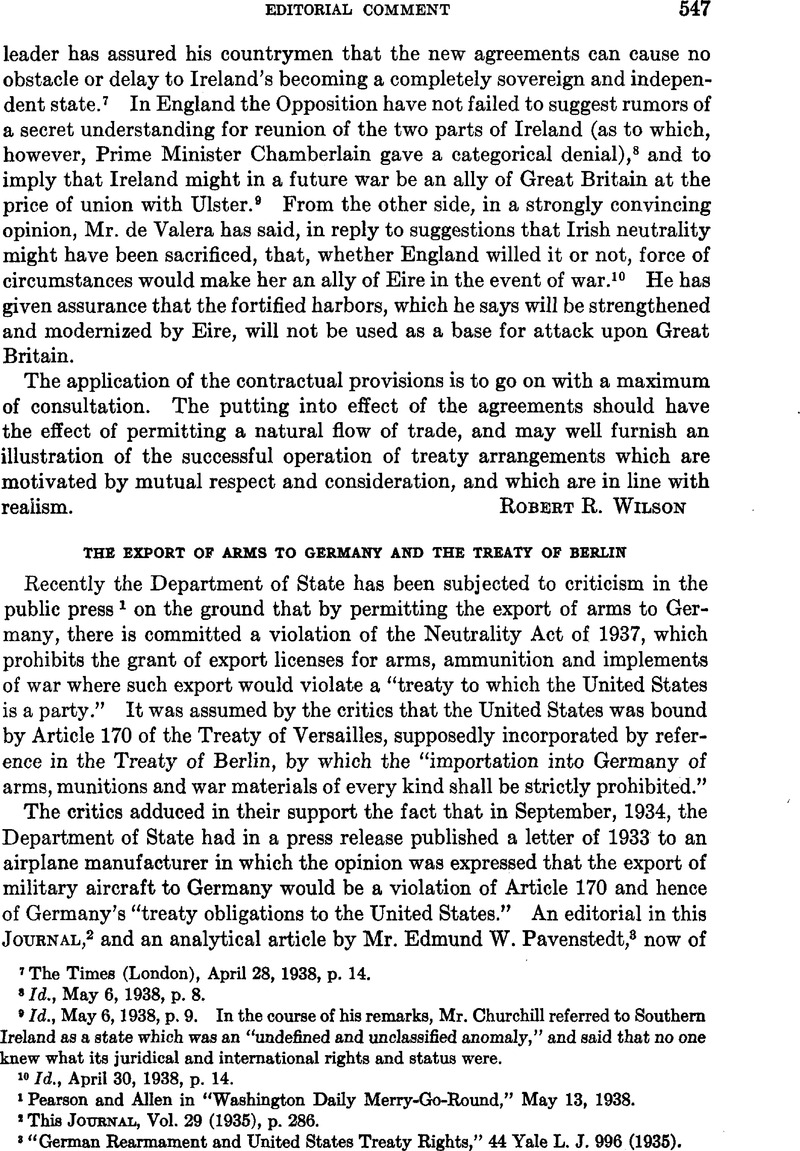No CrossRef data available.
Published online by Cambridge University Press: 12 April 2017

1 Pearson, and Allen, in “Washington Daily Merry-Go-Round,” May 13, 1938.Google Scholar
2 This Journal, Vol. 29 (1935), p. 286.
3 “German Rearmament and United States Treaty Rights,” 44 Yale L. J. 996 (1935).
4 59 Cong. Rec. 6565 (May 5, 1920).
5 For a similar reason, the decisions of American courts which casually assumed that the Versailles prohibition on German nationals to question the war measures of the Allied Powers was an “advantage” to which the United States laid claim under the Treaty of Berlin, are believed to be erroneous. United States v. Chemical Foundation, 272 U. S. 1, 11 (1926); Lange v. Wingrave, 295 Fed. 565 (D. C., S. D. La. 1924); Munich Reinsurance Co. v. First Reinsurance Co., 6 Fed. (2d) 742 (C. C. A. 1925); Klein v. Palmer, 18 Fed. (2d) 932 (C. C. A. 2nd, 1927). The broad reservoir of “rights, privileges, indemnities, reparations or advantages” needed identification and specification by the Executive, for the question whether a treaty or article thereof is or is not in force as to the United States is in first instance a political question. The meaning of a treaty admittedly in force presents a judicial question.
6 44 Stat. L. 2137. A similar provision is to be found in Art. 5 of the Treaty with Japan of 1911 (Malloy, III, 79). It serves, in addition to the ordinary obligations of neutrality, to prevent any discrimination in the export of commodities, including any official discouragement of such export, to Japan. Recently, the State Department has been adjured by numerous groups to embargo arms to Japan alone. Under law and the treaty, this cannot be done. The Neutrality Act can be enforced, for, of course, there is a state of war in China and has been since July, 1937. Cf. New York Times editorial, June 15, 1938. The suggestion [8 Amer. Law School Rev. 1226 (April 1938)] that because diplomatic relations between the belligerents have not been severed — they now have been — or because war has not been declared, or because neutrality proclamations have not been issued, or because the parties choose not to admit that it is a war, therefore, it is not a state of war, is disingenuous. “If the law supposes that,” said Mr. Bumble, “… the law is a ass, a idiot.” The law does not thus flout common sense. Kawasaki Kisen Kabushiki Kaisha of Kobe v. Bantham Steamship Co., May 26, 1938, London Times, May 27, 1938, p. 4. Perhaps physical war conditions in China are now such that the Neutrality Act should be permitted to take its course. Only a few of its provisions are mandatory.
7 Treaty of June 3, 1935, U. S. Treaty Series, No. 897.
8 Cf. 44 Yale L. J. 996, at 1021.